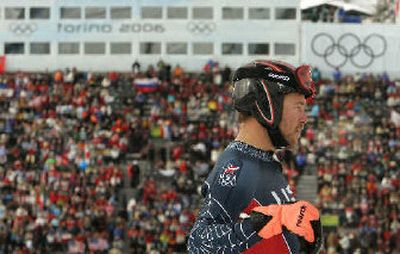Miller skis away with limited regrets

SESTRIERE, Italy – The sticker on the side of the RV read “Go Fast Sports.”
“I’m eating,” Bode Miller said after opening the door. He was holding up a sandwich. “Gimme five minutes.”
An hour earlier, Miller had skidded off the course in the slalom, the last of his five events, completing a 0-for-the-Olympics effort. Then he kept on skiing, ducking reporters again.
I had tracked him down after a mile-long trek in ankle-deep snow, and good as his word, Miller came out soon and was his rambling, revealing, remarkably stubborn self in a half-hour interview. A few highlights:
•”People said, ‘Why can’t you stay in for the two weeks, three weeks? You’ve got the rest of your life to experience the games the way everybody else does.’ But I like the whole package. I always have.”
•”People want athletes to cater to their image of what an athlete should be, but they also want them to fail so they can feel like their screwups are all right. If I make a priority shift, I’ll make it because it’s best for me.”
•”It does matter that it’s the Olympics. I just did it my way. I’m not a martyr, and I’m not a do-gooder. I just want to go out and rock. And man, I rocked here.”
•”The same people who recognize I came out with no medals should recognize I could have won three.”
Give Miller this much: He’s consistent.
A week ago, after spinning off the course in the super-G, he skied a back route through the woods rather than answer questions. On Monday, after finishing sixth in the giant slalom, he ditched his skis at the finish line, dodged a gauntlet of reporters waiting nearby and ran for the exit wearing sneakers and using his ski poles for balance in the slush. After spotting him 100 yards or so, not to mention much lighter footwear, I caught up with him a quarter-mile later.
He was 0 for 4 at that point, and Saturday’s last-chance slalom still loomed. But Miller vowed he wouldn’t do anything different, and he didn’t.
He continued to revel in the nightlife in a hamlet with one real saloon. Miller always occupied the front table, making him impossible to miss.
“It’s important for me to live my life honestly,” he said. Besides, he added, “I was only out one night before a race.”
In fact, Miller said he spent Friday night before the slalom watching “Miracle,” the movie about a bunch of college kids who came together as the 1980 U.S. Olympic hockey team and beat the Soviet Union’s heavily favored “Big Red Machine.”
“That’s what the Olympics are about … underdogs, about providing an opportunity for people to do something they didn’t know they were capable of,” he said.
Miller then talked softly, almost longingly about how U.S. ski teammates Ted Ligety and Julia Mancuso, both just 21 and largely unburdened by expectations, had risen to the occasion at these Olympics and won gold. He was in the same position four years ago in Salt Lake City, when he sneaked in and won two silvers.
To recreate that feeling, Miller said he went as far as slacking off in his training.
But that didn’t work. Miller came here as an overwhelming overdog, the defending overall World Cup champion, the first American to hold that title since 1983. Anybody who saw NBC’s promotional campaign ahead of the Winter Olympics must have thought all the other skiers in the world were auditioning for parts as extras in Miller’s highlight reel.
“I wanted an Olympic experience like in ‘Miracle.’ But how was it for the Russians?” Miller said, leaving little doubt which role was thrust on him. “Horrible.”
But hardly surprising, I countered, considering the high-paying endorsement deal he took from Nike and a few other sponsors. Miller then countered that he left plenty of money on the table, and accepted only those deals that let him put his message out unfiltered by the media.
I offered him the same. “What would you tell people who are going to look at you in these Olympics and see a failure?”
Miller paused.
“Where the quality of life fits in the priority scale is something everybody has to decide for themselves. Nobody else can tell you what your quality of life is, or should be.”
I told him that sounded like an excuse to party.
“If I wasn’t prepared at the start of the races, that would be something I would look at. But I guarantee you every athlete who stood up at the top of the hill could say, ‘Hey, what about that weightlifting workout you skipped last summer or whatever?’
“Me, it’s been an awesome two weeks. I got to party and socialize at an Olympic level.”